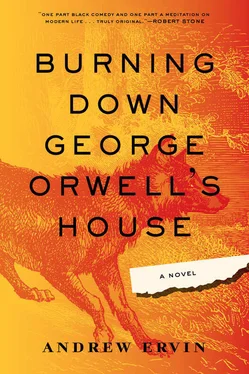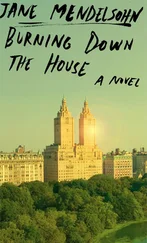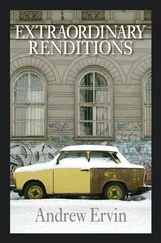He placed his water-damaged books on a bedroom shelf and pulled a chair up to a window. The mist obscured the view of the sound and mainland and he couldn’t see any farther than the garden. He was so happy to find his copy of Nineteen Eighty-Four intact.
Ray checked the bolts on the front and back doors and fixed a bite to eat while he could see. He was still acclimating to life without electricity or gas. It was a hassle, but that was the whole point. He dropped some more peat bricks onto the fire and put a pot on the stove to warm a can of soup. It all felt so primitive —and that was wonderful and intimidating at the same time, but if bony and wheezy old Orwell could live this way so could he.
Over the next few days, Ray managed to convince himself that he was staying out of the rain in order to avoid some nascent flu symptoms creeping into his musculature. That he was simply collecting his wits after the awful events of the past few weeks and months. In reality, however, or in what passed for reality, he was scared shitless. He heard noises from the attic crawl space, the chimney, from the bushes surrounding the house. The floorboards groaned upstairs. Wind growled at him through the windows. Pacing-the-floorboards boredom became preferable to venturing outside and confronting the dead animal at the door, which in his imagination had grown to the size of the red deer that sailed past the kitchen windows. He tried not to think about what had left it there.
The weather was so dismal that he ended up spending his entire first week on Jura holed up indoors and drinking as much whisky as he could pour down his gullet. He did some reading now and then, but was distracted by the blank wall of fog and mist out the window. His attention span had shrunk so much that he couldn’t make it through more than a page or two of Orwell at a time. Unable to focus on anything for more than a few minutes, he grew restless. Even out in the middle of nowhere he felt trapped and hemmed in on all sides, but he did manage to settle into a daily routine.
Every morning, he gathered old newspapers and peat bricks and built a fire to warm a pan of water up for some instant coffee. Then he would spend several hours upstairs in his reading chair, from which he could watch the rain and allow the day’s hangover to withdraw. He stopped shaving because heating the water was such a pain. Sometimes he would attempt to get through a few pages of Nineteen Eighty-Four or some selections of Orwell’s collected letters or the tedious Diaries where he had recorded the minutiae of his farming and gardening, the amount of oil he used every day. None of it offered any insight into Winston Smith or Nineteen Eighty-Four .
When, around midday, he finished reading or not reading, Ray would head downstairs to scavenge some organic cookies or, if he was feeling ambitious, a canned good. The days were long. Before the sun could set — not that he ever saw the sun — he arranged some candles and a bottle of scotch so that he could find them in the dark. He longed for a hike, but the rain wouldn’t let up. In the evenings, he sat next to the fire and drank whisky again until sleep tugged him down into the cushions. He had neglected to bring pornography. During those late hours, drunk enough to make turning back impossible, his thoughts again began to grow dark and more sinister.
As long as Ray could remember, since he was a little kid running amok in the endless rows of corn, his mind had contained partitioned rooms he knew not to enter; in them were countless self-perceptions better left un-thought about and which generated moods that later in life — particularly after his career at Logos took off — his personal safety required him to avoid. But left by himself for days on end, half-dozing next to a dying fire, with the large amounts of whisky unable to fight off the constant din of the rain, he couldn’t help himself from picking open those locks and peering inside.
He thought a lot about his sister Becky, who had taken on the responsibility of caring for their mother. She had it so easy, what with her unquestioned acceptance of the status quo. Becky worked forty hours a week, believed in the literal divinity of Jesus Christ, and took pleasure in the hilarity of network television sitcoms. Unlike his father, Ray didn’t care about the failures of a professional sports team or need to insist upon the innate superiority of one soft-drink brand over another. He wished it were otherwise.
Left to his own brooding for too long, Ray came to recognize that nothing in the entire goddamn world meant what it was supposed to. He had just walked away from a high-paying job in order to hide out in a damp house in Scotland. Maybe that was another big fucking mistake. He had been so stupid, but part of him — a big part — no longer cared. Nothing mattered any longer, not really, except for the fact that each gulp of single malt scotch tasted even sweeter than the previous and that remained true down to the very bottom of each bottle.
Every two or three days Ray opened the front door and found another unidentifiable animal carcass on the mudroom stoop. His sightseeing expeditions extended to the edge of the garden, where he hurled the bodies into the bushes with a shovel. Otherwise he stayed indoors. He grew bored and claustrophobic, but some creature was lurking out there waiting for him. His interaction with the locals consisted of peeking out the window when he heard their 4x4s driving past Barnhill. He came to recognize the sounds of five different vehicles that made their way from the Kinuachdrachd settlement down to Craighouse and back again.
Sometimes Ray couldn’t remember why he had come to Jura and other times he couldn’t imagine living anywhere else. The scotch pooled into a murky, aqueous sense of depression that ebbed and flowed, ebbed and flowed. Some days were better than others. Some days were not.
He was attempting to read the memoir of one of Orwell’s contemporaries by the last evening light of the kitchen windows when a scraping noise came from the front door. He remained still, but the words “Loneliness began for me now fierce, desperate, taking on an importance out of all proportion to its quality which was that of a boy in his ’teens who” shook in his hands. There came another sound, and it grew louder. He put the book down.
Something rustled in the bushes outside the kitchen, then a monstrous face appeared in the window: an animal covered in mangy wet fur. It looked at Ray with knowing eyes that in a single glance interrogated him and his intrusive presence in this remote place, trapped in an old farmhouse a mile from the closest neighbors. The creature growled as if to speak and Ray screamed, but the hideous face still stared at him, its eyes shining with some fierce purpose, its crooked teeth glistening sharply from amid the soiled fur, until its so-nearly-human expression changed. In some savage and instinctual way, the thing appeared as startled as he was. It motioned as if to communicate with him through the windowpane: “Is everything okay, Ray?” it asked.
“Farkas? You scared the shit out of me.”
“Not literally, I hope. Would you mind letting me in?”
Ray unbolted the front door, where Farkas stood dripping wet. “Come in, come in,” he said. “You’re absolutely soaked.”
“Only on the outside, Ray,” Farkas said. “Only on the outside.” He sat on the mudroom bench and removed his wellingtons. “I could however use a wee dram if you have some on board.”
“I have a bottle I’ve been saving for a special occasion, in fact. You go sit by the fire.”
Farkas pulled a chair up. “I’m terribly sorry to frighten you like that,” he said. “And I hope I didn’t catch you at a bad time, as I don’t mean to interrupt what you’re doing up here … what are you doing up here? I would’ve telephoned, but that wasn’t really an option, now was it?”
Читать дальше












